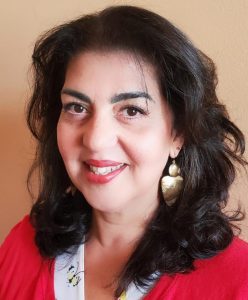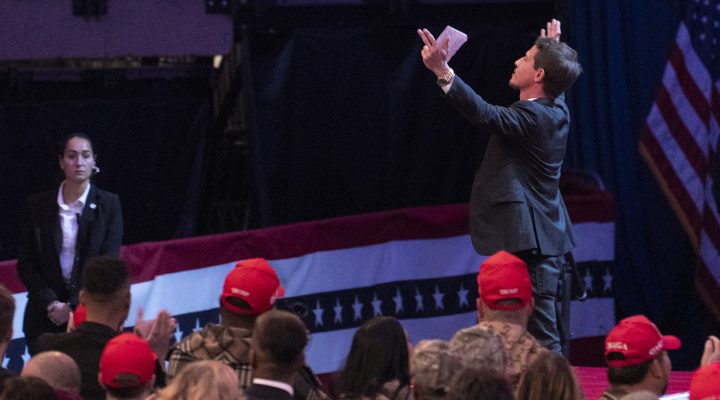In a world increasingly divided by hate and prejudice, the recent remarks by comedian Tony Hinchcliffe at a Trump rally in New York City remind us of the urgency with which we must confront racist ideologies.
His comments, describing Puerto Rico as a “floating garbage island” and perpetuating harmful stereotypes about Latinos, are not merely misguided jokes, they reflect a broader societal problem that calls for a robust response from the church. As Christians, we are challenged to stand firm against such divisive rhetoric, guided by our faith and the example of those who have spoken out against injustice before us.

Rosaly Guzman
Martin Niemöller’s poignant words resonate deeply in this context:
First they came for the Socialists, and I did not speak out, because I was not a Socialist.
Then they came for the Trade Unionists, and I did not speak out, because I was not a Trade Unionist.
Then they came for the Jews, and I did not speak out, because I was not a Jew.
Then they came for me, and there was no one left to speak for me.
These lines serve as a haunting reminder of the consequences of silence in the face of oppression. Niemöller, a German pastor, initially failed to speak out against the rising tide of Nazism, only to find himself among the persecuted when he finally understood the implications of his inaction. As the church, we must heed this lesson, recognizing that allowing hateful speech to go unchecked inevitably leads to a culture where all marginalized voices are at risk.
“Allowing hateful speech to go unchecked inevitably leads to a culture where all marginalized voices are at risk.”
The Bible calls us to love our neighbors as ourselves (Mark 12:31), a commandment that extends to all people, regardless of their nationality or ethnicity. The Apostle Paul writes in Galatians 3:28 that in Christ, there is neither Jew nor Gentile, neither slave nor free, nor is there male and female, for we are all one in Christ Jesus. This radical equality challenges us to reject any ideology that seeks to divide or dehumanize individuals based on their background.
When we encounter statements like those made by Hinchcliffe, we must remember our duty as Christians to speak out against hate. Ephesians 4:29 urges us not to let any unwholesome talk come out of our mouths, but only what is helpful for building others up according to their needs. Racist remarks do not just harm individuals; they erode the fabric of community and sow seeds of division that can lead to real-world violence and discrimination.
Silence in the face of such comments emboldens those who perpetuate hate. It sends a message that such rhetoric is acceptable, or at the very least, tolerable. This is particularly dangerous in a climate where marginalized groups are already vulnerable. As Christians, we are called to be salt and light in the world (Matthew 5:13-16), illuminating the truth and preserving the dignity of every human being.
If we remain silent now, we risk normalizing a culture of racism and discrimination that can spiral out of control. As Niemöller’s quote illustrates, the consequences of inaction eventually reach us all. When we allow one group to be dehumanized, we set a precedent that can easily be turned against others, including ourselves.
“When we allow one group to be dehumanized, we set a precedent that can easily be turned against others, including ourselves.”
The church must actively counteract the toxic narratives that devalue individuals based on their ethnicity. This requires intentionality in our teachings, community outreach and engagement with broader societal issues. Romans 12:2 encourages us not to conform to the pattern of this world, but to be transformed by the renewing of our minds. This transformation is necessary for cultivating a culture of compassion and understanding within our congregations.
Engaging in open dialogues about race, privilege and justice within our church communities can be a vital step toward fostering an environment where everyone feels valued and heard. Additionally, supporting initiatives that advocate for the rights and dignity of marginalized groups such as immigrants can further demonstrate our commitment to living out the love of Christ.
As Christians, we cannot afford to be passive observers in a world filled with division and hate. We are called to action, to stand up for those who cannot stand for themselves (Proverbs 31:8). The church must boldly confront racism and hate speech, recognizing that our silence equates to complicity.
In light of the recent remarks made by Hinchcliffe, let us remember our duty to speak out against injustice. Let us echo the words of Niemöller and say, “Not on my watch.” We must foster a community that uplifts all individuals, celebrating our differences as reflections of God’s diverse creation.
The church has a vital role to play in challenging racism and fostering understanding among all people. By speaking out against hateful rhetoric, we embody the love of Christ, affirming that every person is made in the image of God (Genesis 1:27) and deserving of respect and dignity.
Let us take up this mantle with courage and compassion, ensuring that when the next wave of hate rises, we are ready to stand firm and speak out for those who cannot speak for themselves. Together, we can build a more just and loving society, living out the commandment to love our neighbors as ourselves. We never know, one day it could be us.
Rosaly Guzman is a teacher, speaker and life coach. She holds a master’s degree in theology and is working on a doctoral degree in ministry. She serves at Crosslife Church in Oviedo, Fla,, in the women’s ministry.
Related articles:
How will your grandchildren look back on your vote this year? | Opinion by Mark Wingfield
Jesus at the MAGA rally | Opinion by Martin Thielen
Undecided voters, time has run out | Opinion by Catherine Meeks


